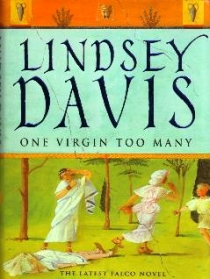
Much of this book has been given over to descriptions of varia priesthoods, Deified Emperors, and the rites of the Arval Brothers and Vestal Virgins. What was their purpose and function within the state? Why have they been included as illustrations of the life of the state on the Palatine with Vespasian taking direct intervention, as described by Rutilius Gallicus?
AD 74, late May. Falco has just arrived home from Lepcis Magna in Tripoli with dire news to deliver to his sister. Vespasian and his Great Census interrupt. Next day, Falco crosses his bridge of the unknown and delivers the news. A little 6 year old girl, strong candidate for election as a Vestal Virgin, approaches Falco with her suspicions that someone is trying to kill her. Falco (recently raised to equestrian status by Vespasian, and appointed Procurator of the Sacred Geese and Poultry) has had enough for one day. He declines to take the girl as a client and sends her home. An act which was to cause him quite some work.
![]()

